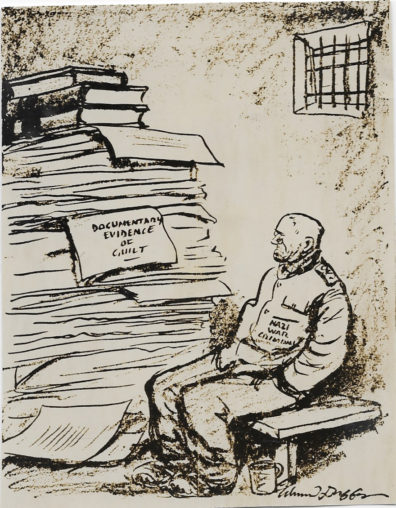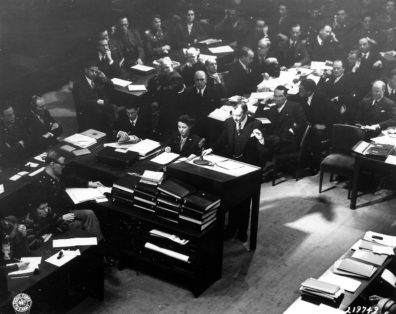On November 21, 2015, seventy years will have passed since the world stopped to listen to the opening statement of the trial against major Nazi war criminals before the International Military Tribunal (IMT) at the Palace of Justice in the city of Nuremberg, Germany. The Opening Address was masterfully delivered by Justice Robert H. Jackson as Chief U.S. Prosecutor. Assembled in the courtroom that day were four teams of prosecutors, an international group of judges representing the Allied nations (United States, Great Britain, France and Russia), twenty-one German defendants, and dozens of officials and media representatives from across the globe. The trial began on November 20, 1945 and ended on October 1, 1946. The IMT was tasked to try twenty-three of the most important political and military leaders of the Third Reich; although defendant Martin Bormann was tried in absentia, and defendant Robert Ley committed suicide within a week of the trial’s commencement.

Credit: Edmund Duffy, The Baltimore Sun, December 7, 1945
Months before Jackson entered the courtroom of the trial at Nuremberg, he had worked through the rough draft of the opening statement to clearly articulate his acute sense of responsibility as a prosecutor and to exercise just the right tone of restraint. It was his primary objective to hold Nazi leaders, accused of the devastating crime of “aggressive war-making,” accountable within the reckonable framework of the law. To do so, it was his decision that the trial be based on documentary evidence rather than eyewitness testimony. While the decision would rely less on potentially dramatic witness testimony, it provided an irrefutable record of the Nazi’s calculated plan to annihilate all Jewish individuals from the face of the earth.
So, as Jackson stood at the podium in the courtroom of this historic trial, he formally acknowledged the bench, and then recognized “[t]he privilege of opening the first trial in history for crimes against the peace of the world …”. Jackson then brilliantly captured both the honor and the grave responsibility he felt in this single, remarkable phrase: “That four great nations flushed with victory and stung with injury, stay the hand of vengeance and voluntarily submit their captive enemies to the judgment of the law is one of the most significant tributes that Power has ever paid to Reason.”
Described as “the greatest trial in history” by Sir Norman Birkett, one of the British judges who presided over it, the trial against major war criminals before the IMT set a precedent for the structure of international criminal law. The formation of the IMT has influenced the world with subsequent trials from Sierra Leone to the former Yugoslavia, Cambodia, The Hague, and Rwanda. International prosecutors who have attended the Jackson Center’s annual International Humanitarian Law Dialogs at Chautauqua Institution each August readily attest to the important role Jackson’s Nuremberg legacy has played in their own work to apply the rule of law to perpetrators of war crimes.

Credit: United States Army Signal Corps. Katherine Fite Lincoln Papers, Harry S. Truman Library & Museum.
On the 70th Anniversary of the greatest trial in history, it is the hope of the Jackson Center that the commemoration will mark the beginning of collaborative dialogue to address current and future conflicts, driven by the profound wisdom of Justice Jackson. In his Opening Statement, Justice Jackson chose the following words to characterize the meaning of the trial and the importance of extinguishing what helped foster the creation of the Nazis.


